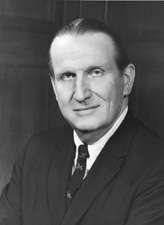James Allen (Alabama politician)
James Browning Allen (December 28, 1912 – June 1, 1978) was a Democratic U.S. senator from Gadsden, Alabama.
James Allen | |
|---|---|
 | |
| United States senator from Alabama | |
| In office January 3, 1969 – June 1, 1978 | |
| Preceded by | J. Lister Hill |
| Succeeded by | Maryon Pittman Allen |
| 17th and 20th Lieutenant Governor of Alabama | |
| In office January 15, 1951 – January 17, 1955 | |
| Governor | Gordon Persons |
| Preceded by | James C. Inzer |
| Succeeded by | William G. Hardwick |
| In office January 14, 1963 – January 16, 1967 | |
| Governor | George Wallace |
| Preceded by | Albert B. Boutwell |
| Succeeded by | Albert Brewer |
| Member of the Alabama Senate | |
| In office 1946–1950 | |
| Member of the Alabama House of Representatives | |
| In office 1938–1942 | |
| Personal details | |
| Born | James Browning Allen December 28, 1912 Gadsden, Etowah County Alabama, U.S. |
| Died | June 1, 1978 (aged 65) Gulf Shores, Alabama, U.S. |
| Resting place | Forrest Cemetery in Gadsden, Alabama |
| Nationality | American |
| Political party | Democratic |
| Spouse(s) | (1) Marjorie Stephens (her death) (2) Maryon Pittman |
| Alma mater | University of Alabama University of Alabama School of Law |
| Military service | |
| Allegiance | |
| Branch/service | |
| Years of service | 1943–1946 |
| Unit | Reserves |
Life and career
The Gadsden native attended the University of Alabama and the University of Alabama School of Law, both located in Tuscaloosa. At the University of Alabama he was a member of Alpha Sigma Phi. He practiced law in Gadsden from 1935 to 1968 and was a member of the Alabama House of Representatives from 1938 to 1942. He resigned from the state legislature to enter active duty in the United States Naval Reserve from 1943 to 1946. He again ran for office after World War II and was a member of the Alabama Senate from 1946 to 1950. He was the 17th and 20th Lieutenant Governor of Alabama from 1951 to 1955 and again from 1963 to 1967.[1]
In 1968, James Allen was elected to succeed the retiring Democratic U.S. Senator J. Lister Hill of Montgomery. Allen won 638,774 (76 percent) to 201,227 (24 percent) for his Republican opponent, Perry O. Hooper, Sr.[2]
Like his Republican Senate colleague, Jesse Helms of North Carolina, James Allen was a master of parliamentary procedure. He was considered to have revived the filibuster rule during his nearly nine years as a senator.[3] James Allen was known as one of the most conservative Democrats in the chamber, more conservative even than many Republicans at that time. He was an active opponent of the Panama Canal Treaty of 1978. James Allen received one vote for the Republican vice-presidential nomination at the 1976 Republican National Convention.[4][5]
In March 1974, James Allen stated that Governor of Alabama George Wallace would run in the 1976 Democratic primary and that he believed the Wallace campaign would seek to prevent a repeat of the previous election cycle where the popular vote was not translated into his support from delegates.[6]
Following the 1974 midterm elections, James Allen pledged to use filibusters against liberal officeholders in favor of large spending in the upcoming 94th United States Congress, reasoning that some of the newly elected Democrats could favor larger spending than the members they had replaced: "I don't feel the voters have given any mandate toward increased expenditures. The people's wishes as indicated by the vote are for us to curtail unnecessary programs and cut Federal spending." It was thought at this time that James Allen "could emerge as a leader of the Senate's conservative bloc with the retirement of Senator Sam J. Ervin, Democrat of North Carolina, and the aging of other conservatives".[7]
In December 1974, James Allen led a group of senators in a filibuster against an amendment previously passed in the House of Representatives designed to curb Government enforcement of desegregation orders. The filibuster ended with a two–thirds majority voting 56 to 27 to end debate on language revising the amendment, marking only the 19th time a filibuster was ended in such a manner in Senate history. James Allen stated that the closure move would result in a legislative delay, Hugh Scott replying, "The supplemental is being delayed by the opposition of the Senator from Alabama to the Scott-Mansfield amendment."[8]
James Allen served in the Senate until his death of a heart attack on June 1, 1978, at the resort community of Gulf Shores, Alabama. He is interred at Forrest Cemetery in Gadsden. Governor George C. Wallace, under whom James Allen served previously as lieutenant governor, appointed Allen's widow, Maryon Pittman Allen, to succeed him in the Senate. However, Mrs. Allen lost the special Democratic primary to fill the remaining two years of her husband's term to Donald W. Stewart of Anniston. Stewart then defeated James D. Martin of Gadsden, who became the Republican nominee after a primary had already been held between George W. Nichols and Elvin McCary, also of Anniston, and a longtime friend of Senator James Allen's. For the change in nominees to occur, Nichols, who defeated McCary in the special Republican primary, had to agree to step down from the race.[9]
See also
- List of United States Congress members who died in office (1950–99)
References
- James Allen, Lieutenant Governors of Alabama
- Billy Hathorn, "A Dozen Years in the Political Wilderness: The Alabama Republican Party, 1966–1978", Gulf Coast Historical Review, Vol. 9, No. 2 (Spring 1994), p. 30
- "James Allen's Widow is Named to Senate" (PDF), New York Times, June 9, 1978
- "US Vice President – R Convention". Our Campaigns. Retrieved October 23, 2011.
- UPI (August 20, 1976). "...Alabama Delegation". Florence Times – Tri Cities Daily. p. 2. Retrieved October 23, 2011.
- "SENATOR SEES RACE BY WALLACE IN 1976". New York Times. March 11, 1974.
- "Senator Allen Pledges Fight Against Congress Spenders". New York Times. November 10, 1974.
- "Senate Cuts Off Filibuster; Voids House Busing Curb". New York Times. December 15, 1974.
- "A Dozen Years in the Political Wilderness", pp. 36-37
External links
- United States Congress. "James Allen (id: A000127)". Biographical Directory of the United States Congress.
| Party political offices | ||
|---|---|---|
| Preceded by J. Lister Hill |
Democratic nominee for U.S. Senator from Alabama (Class 3) 1968, 1974 |
Succeeded by Donald Stewart |
| Political offices | ||
| Preceded by James C. Inzer |
Lieutenant Governor of Alabama January 15, 1951–January 17, 1955 |
Succeeded by William G. Hardwick |
| Preceded by Albert Boutwell |
Lieutenant Governor of Alabama January 14, 1963–January 16, 1967 |
Succeeded by Albert Brewer |
| U.S. Senate | ||
| Preceded by J. Lister Hill |
U.S. senator (Class 3) from Alabama January 3, 1969–June 1, 1978 Served alongside: John J. Sparkman |
Succeeded by Maryon Pittman Allen |

